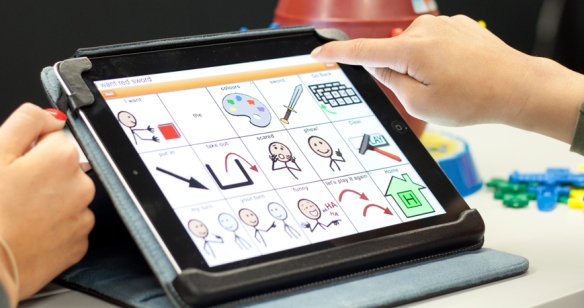(844) 5-SPEECH
Will the use of an AAC device hinder speech development?
March 2, 2016
 According to the American Speech-Language Hearing Association, an augmentative and alternative communication (AAC) device serves as an alternate mean of communication used to supplement or replace speech in individuals who are unable to communicate effectively. AAC devices may be utilized for children with autism who present with significant speech or language difficulties or adults whose speech is no longer functional after sustaining a stroke or traumatic brain injury. Individuals who cannot access speech for functional communication may experience frustration, as they are unable to communicate their thoughts, needs, and desires. The implementation of an AAC device provides a way for these individuals to express themselves.
According to the American Speech-Language Hearing Association, an augmentative and alternative communication (AAC) device serves as an alternate mean of communication used to supplement or replace speech in individuals who are unable to communicate effectively. AAC devices may be utilized for children with autism who present with significant speech or language difficulties or adults whose speech is no longer functional after sustaining a stroke or traumatic brain injury. Individuals who cannot access speech for functional communication may experience frustration, as they are unable to communicate their thoughts, needs, and desires. The implementation of an AAC device provides a way for these individuals to express themselves.
While AAC devices are recommended as an alternate system of communication for those individuals who otherwise have no way of communicating, parents or family members voice similar concerns. Caregivers of AAC users express apprehensions that the use of an AAC device will hinder the development of speech in children or the return of speech production in adults. Parents and family members also feel as though they are giving up on the idea of speech development or production by choosing to implement an AAC device. These concerns have been shown to be invalid.
According to a systemic review published in the American Journal of Speech-Language Pathology, researchers determined that AAC interventions do not impede speech production in children with Autism, but rather support speech development. It is important to note that all children are different, and gains in speech development may vary from case to case.
To conclude, the use of an AAC device will not hinder speech development. AAC devices should be utilized for individuals who cannot access speech for functional communication. An AAC device will allow the individual to communicate more effectively and experience a sense of independence in their daily lives.
Read the systemic review here:
http://ajslp.pubs.asha.org/article.aspx?articleid=1757593
Learn more about AAC here:
http://www.asha.org/public/speech/disorders/AAC.htm
Nicole Sullivan M.A., CF-SLP TSSLD
Recent News

Did What You Hear Make Sense?
March 3, 2025

The Importance of Early Intervention
January 27, 2025

How Parents Can Support Everyday Language Building
January 20, 2025

The Benefits of Support Groups for Adolescents Who Stutter
January 13, 2025

3 Common Misconceptions About Autism Spectrum Disorder (ASD)
January 6, 2025

What are Core Words?
December 30, 2024

